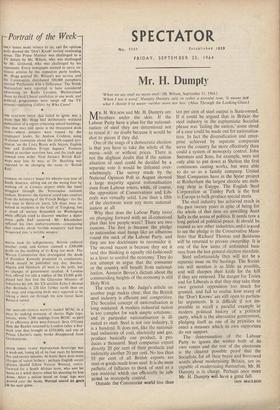Mr. H. Dumpty
'When we say steel we mean steel.' (H. Wilson, September 11, 1964.) 'When I use a word,' Hum ply Dtttnpty said, in rather a scornful tone, 'it means just what I choose it to mean—neither more nor less.' (Alice Through the Looking-Glass.) MR, H. WILSON and Mr. H. Dumpty are brothers under the skin. If the Labour Party have a plan for the national- isation of steel they are determined not to reveal it: no doubt because it would be shot to pieces if they did.
One of the snags of a democratic election is that you have to take the whole of the menu—with or without prices. There is not the slightest doubt that if the nation- alisation of steel could be decided by a separate vote it would be defeated over- whelmingly. The survey made by the National Opinion Poll in August showed a large majority against nationalisation even from Labour voters, while, of course, the opposition of Conservatives and Lib- erals was virtually solid. Less than a fifth of the electorate want any more national- isation at all.
Why then does the Labour Party insist on plunging forward with an ill-conceived plan that few people want? There are two reasons. The first is because the pledge to nationalise steel hangs like an albatross round the neck of the Labour Party, and they are too doctrinaire to reconsider it. The second reason is. because they see it (and this thinking is equally old-fashioned) as a lever to control the economy. They do not attempt to argue that the consumer or the country will benefit from national- isation. Aneurin Bevan's dictum about the commanding heights of the economy is still Holy Writ. The truth is, as Mr. Judge's article on another page makes clear, that the British steel industry is efficient and competitive. The Socialist' concept of nationalisation is long outdated. A modern industrial nation is too complex for such simple solutions: and in particular nationalisation is in- stated to steel. Steel is not one industry, it is a hundred. It does not, like the national- ised industries of coal, electricity and gas, produce basically one product, it pro- duces a thousand. Steel companies export directly 20 per cent of their products and indirectly another 20 per cent. No less than 55 per cent of all British exports are steel or goods made from steel. It is the most pathetic of fatlacies to think 'of steel as a raw material which can efficiently be sub- jected to monopoly control. Outside the Communist world less than ten per cent of steel output is State-owned. If it could be argued that in Britain the steel industry in the euphemistic Socialist phrase was 'failing the nation,' some shred of a case could be made out for nationalisa- tion. In fact the diversification and enter- prise achieved by separate companies serve the country far more effectively than could a system of monopoly control. John Summers and Sons, for example, were not only able to put down at Shelton the first continuous casting works, but were able to do so as a family company. United Steel Companies have in the Spear project at Rotherham the largest electric arc melt- ting shop in Europe. The English Steel Corporation at Tinsley Park is the first in Europe to bulk-produce special steels.
The steel industry has achieved much in the past twenty years in spite of being for the whole of that time an unwilling Aunt Sally in the arena of politics. It needs now a long period of political peace. It should be treated as are other industries,and it is good to see the pledge in the Conservative Mani- festo that Richard Thomas and Baldwins will be returned to private ownership. It is one of the few items of unfinished busi- ness from the last general election mandate.
Steel unfortunately 'then will not be a separate issue on the hustings. The Social- ists will mention it as little as possible, and will sharpen their knife for the kill if they are returned. The danger for Tories and for Liberals is that they may take their own general opposition too much for granted, and fail to realise how many of the 'Don't Knows' are still open to particu- lar arguments. It is difficult if not im- possible to recall a parallel example in modern political history of a political party, which is the alternative government, pledging itself as one of its priorities to enact a measure which its own supporters do not support. The determination of the Labour Party to ignore the wishes both of its own voters and the rest of the electorate is the clearest possible proof that the Socialists, for all their brave' and borrowed words about modernising Britain, are -in- capable of modernising themselves.' Mr. H. Dumpty is in charge. Perhaps once more Mr. H. Dumpty will have a great fall.
LAIN MACLEOD




























 Previous page
Previous page